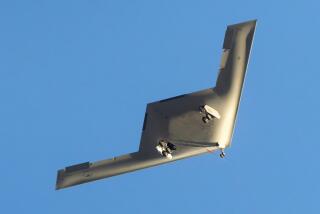Israel’s Controversial Lavi Fighter Debuts
- Share via
LOD, Israel — Israel threw a coming-out party Monday night for the newest and grandest weapon in its military arsenal, a futuristic jet fighter, amid boasts by some that the plane will propel the country into the 21st Century and warnings by others that it will only lead to economic disaster.
More than 2,000 invited guests were on hand here for the official debut of the Lavi, the product of by far the biggest and most expensive military-industrial project ever undertaken in the Jewish state.
The Israeli air force band played, soft drinks flowed and much of the country’s leadership was on hand at the headquarters of Israel Aircraft Industries for the official rollout of Lavi Prototype No. 2. Prototype No. 1 is having instruments installed for the aircraft’s first test flight, which is expected in October.
$1.2-Billion Price Tag
Underlining America’s stake in the project, eight U.S. congressmen, including a possible 1988 presidential contender, Rep. Jack Kemp (R-N.Y.), attended the ceremony. Virtually all of the $1.2-billion bill for the Lavi’s development to date has been paid by the American taxpayer, and billions of dollars more in U.S. funding will be required to build the 300 airplanes scheduled for production by the year 2000.
Defense Minister Yitzhak Rabin said 38 years of American-Israeli cooperation “has reached its peak” in U.S. support of the Lavi program.
Even as the Lavi rollout marked what its proponents would like to see as the program’s “point of no return,” however, its detractors have intensified their arguments that the plane is a technologically advanced millstone around the neck of Israel’s already struggling economy.
If the project goes ahead, the critics predict, Israel, which is already the largest recipient of U.S. foreign aid, will soon be back in Washington seeking even more money. And Washington will face the unhappy choice of either paying up or watching passively as the economic strain of the program erodes the strength of its most important Middle East ally.
While the American defense Establishment could be expected to oppose the plane--each Lavi built means one less American plane sold to Israel--there are plenty of critics in Israel, as well.
Reflecting the fears of many of his military colleagues that the expensive effort to build the Lavi is putting too much pressure on other defense programs, Navy Commander Avraham Ben-Shushan recently commented wryly, “You could pay for the Navy’s entire shipbuilding program just with the accounting errors on the Lavi.”
Rabin conceded Monday that other military programs have suffered to keep the Lavi project going at a time of shrinking defense budgets. “We’re taking tremendous defense risks for the sake of this airplane,” he said.
But he and others said the Lavi represents much more than just a new warplane to Israel. Officials compared its economic impact to that of America’s race to the moon, and they said its psychological impact may be comparable as well.
Prime Minister Shimon Peres, in a radio interview broadcast earlier Monday, called the Lavi “a superb achievement” that “only five or six countries all over the world” could hope to match.
Israeli officials question the Pentagon’s cost estimates for the plane and note that nearly half of its components are to be built in the United States under contract.
A key test for the program is expected this fall, when the U.S. Congress reviews special provisions by which some U.S. aid to Israel is earmarked specifically for the Lavi. Sen. Gary Hart (D-Colo.), another 1988 presidential contender who visited Israel earlier this month, has expressed reservations about the Lavi program.
More to Read
Sign up for Essential California
The most important California stories and recommendations in your inbox every morning.
You may occasionally receive promotional content from the Los Angeles Times.












